Results of telephone consultation through "Over-60 Consumer Trouble Dial 110"
Recent consumer troubles among over-sixties have shown some change (e.g. increase in information/communications related inquiries) which was probably influenced by so-called "active seniors", who actively purchase goods and services through the Internet. The National Consumer Affairs Center of Japan (hereinafter called "NCAC") provided a special telephone consultation service "Over-60 Consumer Trouble Dial 110 in response to increase in troubles among active seniors" (hereinafter called "Over-60 Dial 110") on Thursday-Friday, September 15-16 in tribute to the Respect-for-Senior-Citizens Day (Monday, September 19), which is one of Japanese national holidays. The following shows results of the telephone consultation.1
- 1 This telephone consultation service was provided as part of "the joint campaign to protect the elderly from detriment" in cooperation with 16 consumer centers in the Kanto and Koshinetsu region in Japan.
Overview of "Over-60 Dial 110"
- Official name: Over-60 Consumer Trouble Dial 110 in response to increase in troubles among active seniors
- Date: Thursday-Friday, September 15-16, 2016 (time : 10:00-16:00)
- Place: Consultation Department, NCAC (through a special phone line installed)
- Intended inquiries: those about consumer affairs in general, if a contract signatory is 60 or older
(also acceptable from family members or people around the consumer concerned)
Data from aggregate results of "Over-60 Dial 110"
(1) Number of inquiries
- Thursday, September 15, 2016: 53 cases
- Friday, September 16, 2016: 42 cases
- Total: 95 cases
(2) Nature of contract signatories, etc. (total: 95 cases)
1) Gender of contract signatories
Men comprised 71% of the total.
Diagram 1:
Breakdown of contract signatories by gender
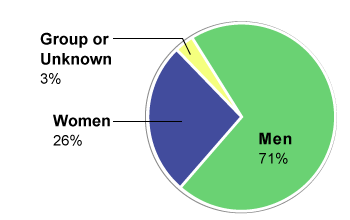
Men comprised 71% of the total. Women comprised 26% of the total. Group or unknown cases comprised 3% of the total.
2) Age of contract signatories
Contract signatories in 60s comprised 40% of the total. Those in 70s comprised 37% of the total.
Diagram 2:
Breakdown of contract signatories by age group
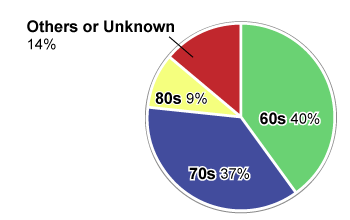
Those in 60s comprised 40% of the total. Those in 70s comprised 37% of the total. Those in 80s comprised 9% of the total. Other or unknown cases comprised 14% of the total.
3) Occupation of contract signatories
The jobless comprised 59% of the total.
Diagram 3:
Breakdown of contract signatories by occupation
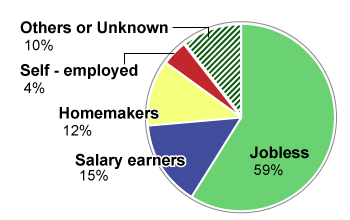
The jobless comprised 59% of the total. Salary earners comprised 15% of the total. Homemakers comprised 12% of the total. The self-employed comprised 4% of the total. Other or unknown cases comprised 10% of the total.
4) Nature of inquirers
Inquiries from family members, etc. comprised 18% of the total.
This tendency equally applies to over-sixties as a whole.
Diagram 4:
Breakdown of cases by nature of inquirers
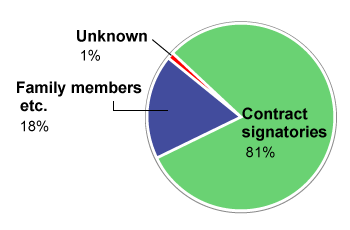
Contract signatories comprised 81% of the total. Family members, etc. comprised 18% of the total. Unknown cases comprised 1% of the total.
5) Purchasing methods
Purchase at shops comprised 45% of the total. Mail order purchase comprised 30% of the total.
Purchase through door-to-door sales or telemarketing, which usually makes up a large proportion in the age group of over-sixties, comprised a smaller proportion than expected.
Diagram 5:
Breakdown of cases by purchasing method
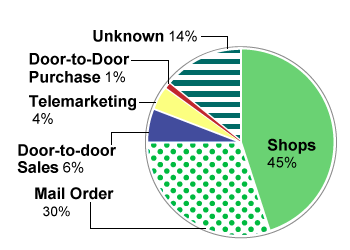
Purchase at shops comprised 45% of the total. Mail order purchase comprised 30% of the total. Purchase through door-to-door sales comprised 6% of the total. Purchase through telemarketing comprised 4% of the total. Door-to-door purchase (by high-pressure buyers) comprised 1% of the total. Unknown cases comprised 14% of the total.
(3) Common goods and services
The most common troubles were those related to adult websites, followed by those related to services including PC support. The inquiries were also marked by troubles related to information/communications (cellular phone service, mobile data communications, optical fiber, digital contents, etc.).
Common goods and services inquired about
- Adult websites: 14 cases
- Services including PC support: 10 cases
- Medical service: 7 cases
- Optical fiber: 6 cases
- Cellular phone service: 4 cases
- Mobile data communications: 4 cases
- Stocks: 3 cases
- Investment trust fund: 3 cases
- Digital contents in general: 3 cases
(In addition to the above, health food products, smart phone service, TV, etc.)
(4) Purchase price
The purchase price was less than 100,000 yen in about 47% of the cases. The next common price range was over 100,000 yen and less than 500,000 yen. (Data was accumulated from 59 cases excluding unknown cases. The average amount of contract was about 4,770,000 yen, while the average amount paid was about 5,390,000 yen.)
Diagram 6:
Breakdown of cases by purchase price (excluding unknown or non-respondent cases)
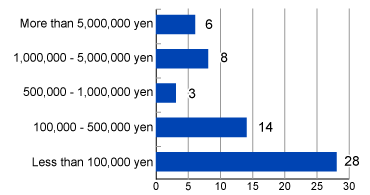
The purchase price was: less than 100,000 yen in 28 cases; 100,000-500,000 yen in 14 cases; 500,000-1,000,000 yen in 3 cases; 1,000,000-5,000,000 yen in 8 cases; more than 5,000,000 yen in 6 cases.
Common cases (nature of each contract signatory noted in parentheses)
- [Case1] I thought it's free of charge and accessed an adult website, but I was suddenly registered and I paid the bill. They might charge me more.
- I searched for a name of a pornographic actress via smart phone. As soon as I tapped the screen, I was suddenly registered as a charged member. I was at a loss and called the website operator for help, but they charged me about 300,000 yen. As I was told, I went to a convenience store, gave out a 13 digit number and paid about 200,000 yen at the register. I also purchased a 90,000 yen electronic prepaid gift card and disclosed its number to the website operator. I thought the transaction would end if I pay the bill. However, there was another phone call from the website operator. I didn't answer the phone. They might charge me more. They know my name and telephone number. How should I handle it?
- (man in his 60s, unemployed)
- [Case2] When I ordered repair service of my PC, the business made me enter into an unnecessary contract for member service and smart phone service. I am dissatisfied with the termination charge.
- When I ordered repair service of my PC, the business induced me to buy a smart phone. As a result, I bought two smart phones for me and my wife. Moreover, the sales person solicited me for more than two hours to enter into a contract for PC support service. In the end, I concluded the additional contract, although it was hard for me to read small print on a thick explanatory booklet. The sales person also solicited me to use a tablet terminal. At first I declined, but he told that it was free of charge, so I accepted the offer reluctantly. After contract conclusion, I came to know that the PC support service was on a three-year contract and that the total amount of payment for the smart phones in four years will be 500,000 yen. I told the business that I didn't need the PC support service, but the contact person told me that the termination charge would be 80,000-100,000 yen. Although I was dissatisfied with the termination charge, I paid it to cancel the contract. I wanted to cancel the smart phone contract as well, but did not because I was told that the termination charge would be 200,000-300,000 yen. I am very annoyed.
- (man in his 60s, unemployed)
- [Case3] A caller claiming to be with a major telephone company induced me to use a fiber optic line, and I entered into a contract for the new service. Later I found out that the caller had lied about the identity. Is it possible to cancel the contract?
- I received a phone call from a person claiming to be with a subsidiary of a major telephone company, who told me that changing telephone lines would reduce the phone charges by 800 yen. I told the caller to accept the offer if the charges would be reduced, and then the caller told that a person in charge would contact me. The person in charge told me via phone to activate my PC and to enter particular data. I could not do as I was told, so an operator visited me to do it for me. When I asked the person if he was with a major telephone company, he said "No, but we might have a relationship with the company". At a later date, I received a contract-like paper, but I feel suspicious of the business. Is it possible to cancel the contract?
- (man in his 70s, unemployed)
- [Case4] Seeing a leaflet for a foot sole supporter, I ordered one pair via phone. It didn't work, so I told the seller that I wanted to return the product, but they declined my request. Is it possible to return the product?
- As I got old, my legs became more prone to numbing, which made my walking difficult. One day I saw a leaflet purporting "You can walk smoothly with this foot sole supporter", and I ordered one pair via phone. While I was wearing the foot sole supporter, I felt pressure in my ankles. The product didn't work even after one week. I told the seller that I wanted to return the product, but they induced me to keep using it two or three months. I couldn't return it. I haven't paid for it yet. Is it possible to return the product?
- (man in his 80s, unemployed)
- [Case5] After seeing an advertisement on a newspaper, I received treatment at a clinic to get rid of puffy bags under my eyes. One year has passed since then, but there is no effect at all. I want my money back.
- I was worried about puffy bags under my eyes. A year ago, I saw a full-page advertisement on the back of a newspaper: "Just one shot can remove puffy bags under eyes". When I called the advertiser to hear their explanation, the contact person said "Visit our clinic right away. It costs around 300,000 yen". I withdrew 300,000 yen from my account and visited there. I was brought to a private room. As soon as a young woman came in, she said "What happened to your face? I've never seen such a terrible face. Poor you". I was very shocked by her words. She said "Treatment will be done only with injection. There are three prices: 600,000 yen; 1,200,000 yen; and 1,800,000 yen. The treatment of 1,800,000 yen gives instant results and will be effective all through your life". I told her that I could pay no more than 300,000 yen. Then she added, "If you receive the treatment today, you can get 100,000 yen discount. You can pay the remaining amount with a credit card". I couldn't refuse any more, and I signed the contract. I didn't receive a copy of the contract. She told that it would take one year to get good results. I waited one year, but there is no effect at all. I want to get a full refund of 540,000 yen.
- (woman in her 70s, homemaker)
Advice for consumers
(1) When you received a bill which you don't recognize, never hurry to pay.
According to inquiries received, more and more over-sixties are getting involved in troubles related to adult websites or false billing. When you see a billing screen which was suddenly shown while browsing an adult website, when you disagree with a bill, or when you receive a billing email for the remaining charges for using a website which you don't recognize, never hurry to pay.
(2) Don't decide on your own. Consult with people around you or your local consumer center.
In case of internet shopping or mail order purchase, contract details tend to be complicated and a solution for troubles may differ case by case. There may be solicitation of a hefty contract or tactful solicitation with unscrupulous sales schemes. If you feel even slightly uneasy, consult with people around you or your local consumer center as soon as possible. One of the effective ways to prevent troubles with telemarketing calls is to use anti-crime goods such as a phone recording device.
(3) Family members and people nearby should pay attention to over-sixties, taking account of difference in lifestyles among individuals.
More and more over-sixties use the Internet and encounter troubles. Consumer troubles among "active seniors" are on the rise. Their lifestyles and telecom use are very varied among individuals. Their capacity for judgment is also varied among individuals. Family members and people nearby should pay attention to over-sixties, taking account of lifestyle differences and likely troubles.
(4) If you feel even slightly suspicious or uneasy, consult your local consumer center right away.
If you feel even slightly suspicious or uneasy, consult your local consumer center right away before making an order, entering into a contract, or making payment.
- * Consumer hotline: 188 (no prefix)
The three digit phone number, which is common nationwide, will connect consumers to a nearby consumer center established by a local government.
Reference
- NCAC receives inquiries from consumers via telephone (03-3446-0999) between 11:00 and 13:00 on weekdays, which is called "lunch break consultation for consumers".
- NCAC provides information on its website about unscrupulous sales schemes targeting the elderly, latest trends, and key points to be shared and noted in each community.
- Some municipal governments lend phone recording devices to residents free of charge.
- Recent changes in consumer troubles among over-sixties; increase in troubles faced by "active seniors" who use the Internet
- (The above web pages are written in Japanese.)
